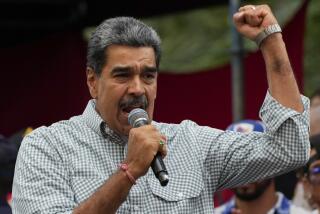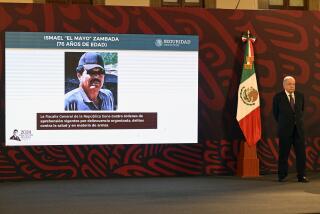Venezuela, Peru Feud Over Spymaster’s Arrest
- Share via
LIMA, Peru — Long-simmering tensions between Venezuela and Peru exploded into the open Tuesday as the two countries bickered over the circumstances surrounding the capture of former Peruvian spymaster Vladimiro Montesinos.
While Peruvian judicial authorities spent the morning questioning the onetime intelligence chief under extraordinarily tight security here in the Peruvian capital, leaders in both countries traded angry charges about how he was tracked down.
Venezuela’s interior minister held a lengthy news conference early Tuesday to categorically deny that Peru or the United States had played any role in Montesinos’ arrest Saturday night in a slum within sight of the presidential palace in Caracas, Venezuela’s capital.
“I must declare that in no moment, under no circumstances, was there the slightest participation of any foreign police,” Interior Minister Luis Miquilena said. “This was work strictly done by Venezuelan police.”
That version contrasts starkly with the account offered up by both FBI and Peruvian officials in recent days. Both have said that the FBI provided crucial information after setting up a sting of a Montesinos associate in Miami on Thursday.
Peruvian Interior Minister Antonio Ketin Vidal, who was in charge of an 80-member team that tracked Montesinos around Latin America during his months as a fugitive, insisted that U.S. and Peruvian cooperation was vital to the arrest.
He promised to offer a detailed account of the capture soon.
“His version is his version,” Ketin said of Miquilena’s account. “I want to say emphatically and strongly that the Peruvian police and the FBI played a direct role.”
The issue even came up during a visit by Peru’s president-elect, Alejandro Toledo, with President Bush in Washington on Tuesday.
“I should acknowledge, and we have said explicitly, how thankful we are to Secretary of State Colin Powell . . . for the participation of the FBI in the capture of Vladimiro Montesinos,” said Toledo, who also asked the U.S. to release confidential files about Montesinos, a longtime CIA ally.”[But] it is equally important that [it was done] in coordination with the Peruvian authorities.”
The issue is sensitive because top Peruvian officials have long believed that Venezuelan President Hugo Chavez actively participated in shielding Montesinos from authorities during the ex-spy chief’s eight months on the lam. The government of Montesinos’ former boss, ousted Peruvian President Alberto Fujimori, allowed a group of Chavez’s military allies to flee to Peru after a failed Venezuelan coup attempt in 1992.
The contretemps over Montesinos signaled a possible further rift in Venezuela’s relations with other South American countries. In particular, it is threatening to reignite a sensitive dispute between Colombia and Venezuela.
Since earlier this year, Venezuela has ignored Colombian pleas to extradite a guerrilla who allegedly participated in the hijacking of a commercial airplane in Colombia in 1999.
But even as Colombian critics began to compare Montesinos’ lightning deportation with the stagnated process to extradite the rebel, Venezuela’s attorney general held a news conference to declare that the two cases are completely different because the guerrilla had committed a crime in Venezuela, for which he was being prosecuted.
Atty. Gen. Isaias Rodriguez admitted, however, that he was unsure whether Montesinos had committed any crimes in Venezuela because he hadn’t been able to talk with him before his deportation to Peru.
“The investigation hasn’t ended,” Rodriguez insisted.
While much of the attention Tuesday continued to focus on Montesinos’ flight and capture, questions also swirled about his future.
The biggest unknown now is whether Montesinos, who faces a possible sentence of life in prison for alleged crimes ranging from money laundering to orchestrating murders, will cooperate with authorities in exchange for leniency.
Patricia Hurtado, the lawyer assigned to Montesinos by the government, told Reuters news service Tuesday, “He said he had about 30,000 videos and was prepared to hand them over in exchange for benefits.” She said the former spy chief had made that offer in remarks to judges.
If he does, that could spell trouble for Fujimori, who fled to Japan in disgrace last year after Montesinos’ spectacular tumble from power.
“There’s no strong evidence against Fujimori right now, but the declarations of Montesinos could be decisive,” said Luis Lamas Puccio, a Peruvian legal analyst following the Montesinos case. “He’s a firsthand witness.”
*
Times staff writer Anuj Gupta in the Washington Bureau contributed to this report.
More to Read
Sign up for Essential California
The most important California stories and recommendations in your inbox every morning.
You may occasionally receive promotional content from the Los Angeles Times.













